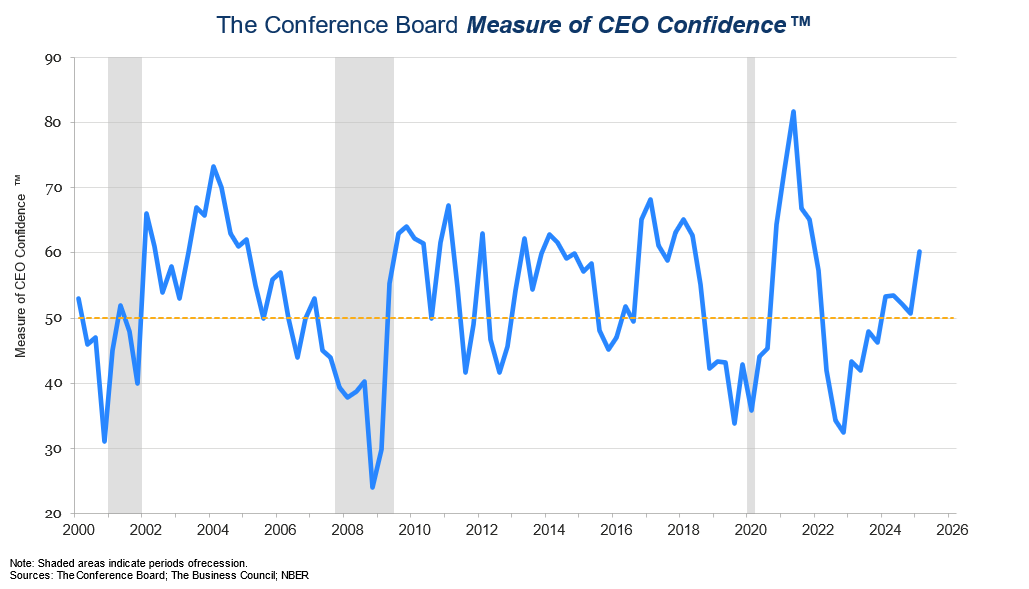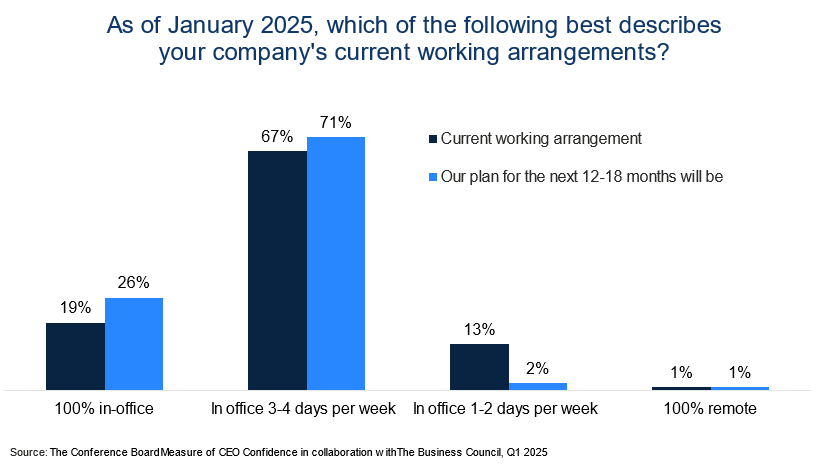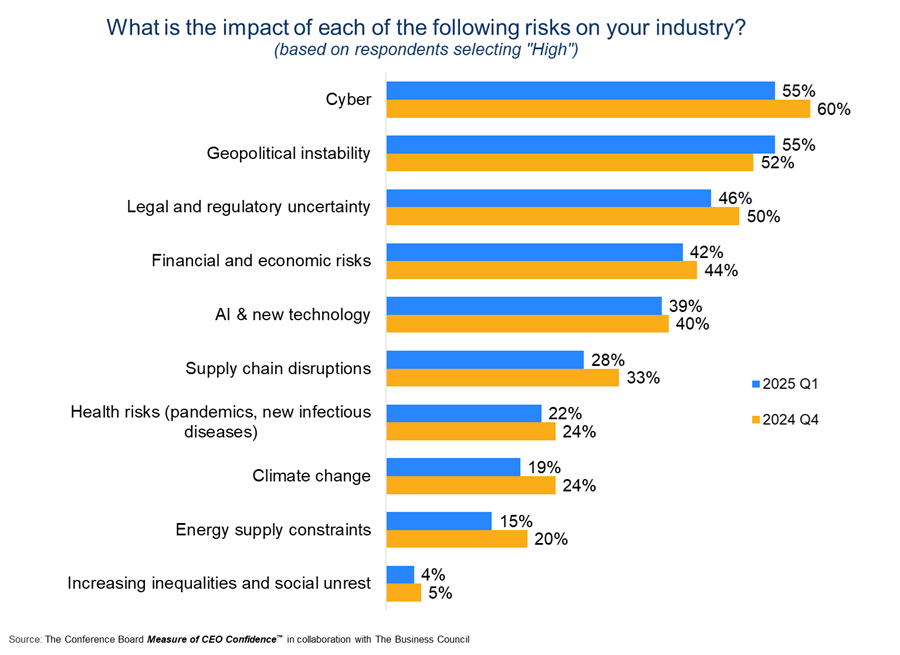
The Conference Board Measure of CEO Confidence™ in collaboration with The Business Council increased by 9 points in the first quarter of 2025 to 60, the highest level in three years. For the first time since early 2022, the Measure was well above 50 in Q1 2025, indicating that CEOs have shifted from the cautious optimism that prevailed in 2024 to a more confident optimism. (A reading above 50 reflects more positive than negative responses.) A total of 134 CEOs participated in the Q1 survey, which was fielded from January 27 to February 10.
“The improvement in CEO Confidence in the first quarter of 2025 was significant and broad-based,” said Stephanie Guichard, Senior Economist, Global Indicators, The Conference Board. “All components of the Measure improved, as CEOs were substantially more optimistic about current economic conditions as well as about future economic conditions—both overall and in their own industries. CEOs’ assessments of current conditions in their own industries also improved. (This measure is not included in calculating the topline Confidence measure). Consistent with an improved expected outlook, there was a notable increase in the share of CEOs expecting to increase investment plans and a decline in the share expecting to downsize investment plans. Still, a majority of CEOs indicated no revisions to their capital spending plans over the next 12 months.”
“Accompanying Q1’s surge in confidence, CEOs also reported an easing of concerns regarding a range of business risks,” said Roger W. Ferguson, Jr., Vice Chairman of The Business Council and Chair Emeritus of The Conference Board. “Compared to Q4 2024, fewer CEOs ranked cyber threats, regulatory uncertainty, financial and economic risks, and supply chain disruptions as high-impact risks. The one exception was geopolitical instability, which 55% of CEOs in Q1 saw as a high-impact risk to their industry—up from 52% last quarter.”

Overall, 73% of CEOs planned to grow or maintain the size of their workforce over the next 12 months, virtually unchanged from last quarter. However, the share expecting to expand their workforce fell to 32%—down from 40% in Q4—while the share planning no change in employment rose to 41%, up from 34%. Notably, the share planning to reduce their workforce ticked up again, rising 1 ppt to 27%. Fewer CEOs reported difficulty finding qualified workers in Q1.
The share of CEOs planning to raise wages by 3% or more over the year climbed to 71%, up from 63% in Q4. A majority of CEOs—60%—plan wage increases in the 3.0–3.9% range, up from 48%. Regarding work arrangements, a schedule with 3-4 days a week in the office remained the most popular option. However, the share of CEOs planning to shift away from remote work—toward 3-4 days or 100% in-office—over the next 12-18 months continued to climb.
Current Conditions
CEOs’ assessment of general economic conditions became positive in Q1 2025:
CEOs’ assessments of conditions in their own industries also flipped to positive in Q1:
Future Conditions
CEOs’ expectations about the short-term economic outlook surged in Q1 2025:
CEOs’ expectations for short-term prospects in their own industries also became far more optimistic:
Employment, Recruiting, Wages, and Capital Spending
Work Arrangements and Return to Office:
Most companies have a hybrid work arrangement, but more CEOs plan on shifting toward a 100% in-office workforce:

Industry Risks:
Compared to last quarter, the impact and intensity of most risks have declined among CEOs:

About The Conference Board
The Conference Board is the member-driven think tank that delivers Trusted Insights for What’s Ahead®. Founded in 1916, we are a non-partisan, not-for-profit entity holding 501 (c) (3) tax-exempt status in the United States. ConferenceBoard.org
About The Business Council
The Business Council is a forum for the CEOs of the world’s largest multinational corporations across all industry sectors. Members gather several times each year to share best practices, network and engage in intellectually provocative, enlightening discussions with peers and thought-leaders in business, government, academia, science, technology and other disciplines. Through the medium of discussion, the Council seeks to foster greater understanding of the major opportunities and challenges facing business, and to create consensus for solutions. The Business Council is a non-partisan, not-for-profit entity holding 501 (c) (6) tax-exempt status. The Business Council does not lobby. Visit The Business Council’s website at www.thebusinesscouncil.org
For further information contact:
Joseph DiBlasi
781.308.7935
jdiblasi@tcb.org
Jonathan Liu
jliu@tcb.org
PRESS RELEASE
CEO Confidence Rose Significantly in Q1 2026
February 26, 2026
IN THE NEWS
Dana Peterson Discusses CEO Confidence
October 24, 2024
IN THE NEWS
Topindustriëlen zien wereld splitsen in competitieve handels
May 24, 2022
IN THE NEWS
Roger Ferguson: CEO confidence dip, inflation, and more
October 06, 2021
IN THE NEWS
Steve Odland on CEO Confidence and Returning to the Office
September 22, 2021
IN THE NEWS
CEO Confidence Soars in Q2
May 20, 2021
All release times displayed are Eastern Time
Note: Due to the US federal government shutdown, all further releases for The Conference Board Employment Trends Index™ (ETI), The Conference Board-Lightcast Help Wanted OnLine® Index (HWOL Index), The Conference Board Leading Economic Index® of the US (US LEI) and The Conference Board Global Leading Economic Index® (Global LEI) data may be delayed.
CEO Confidence Survey Quarterly Report
October 16, 2025 | Article

The Cost of Soaring Uncertainty: What Uncertainty Means for the US Outlook
April 22, 2025 | Essay
The Conference Board Measure of CEO Confidence™ for China: 2022 H2 Results
November 25, 2022 | Report
The Conference Board Measure of CEO Confidence™ for Europe by ERT: 2022 H1 Results…
May 24, 2022 | Report
The Conference Board Measure of CEO Confidence™ for China: 2022 H1 Results
May 24, 2022 | Report
CEO confidence drops sharply on worries about inflation and recession
May 19, 2022 | Quick Take

Economy Watch: Trends in Consumer & CEO Confidence
November 12, 2025

Economy Watch: CEO Confidence in an Uncertain World
June 11, 2025
C-Suite Perspectives

Headed for Recession? Only 30% of CEOs Think So
August 08, 2024

The Evolving Economic Outlook for Europe
July 10, 2024

Trends in CEO Confidence in 2024
June 12, 2024
